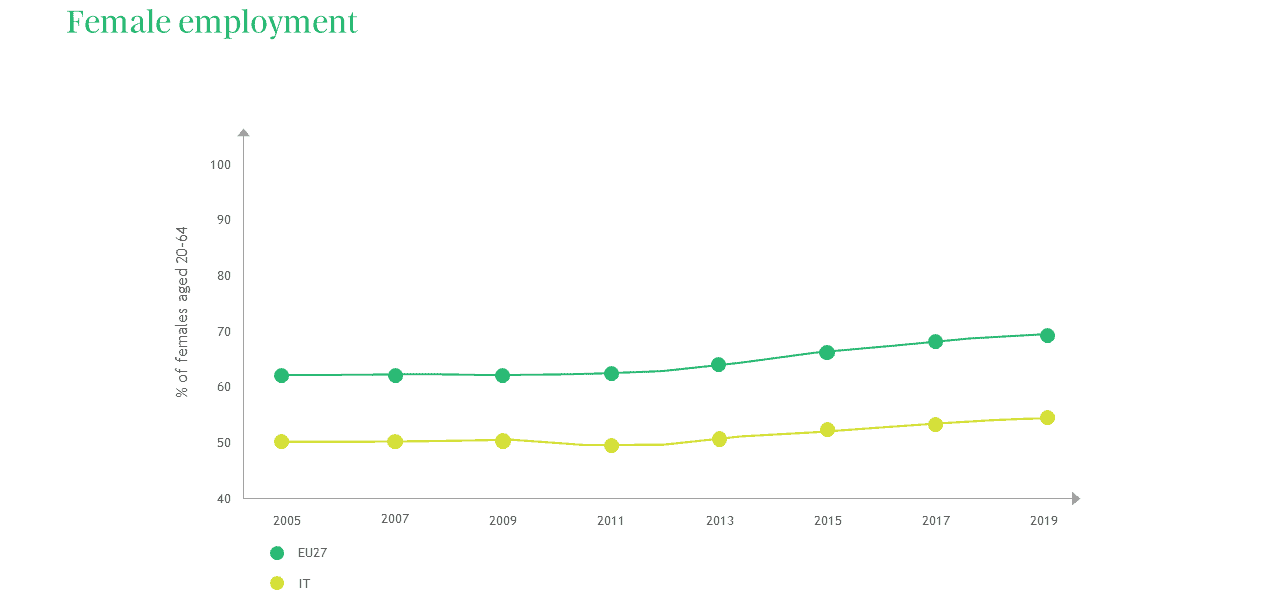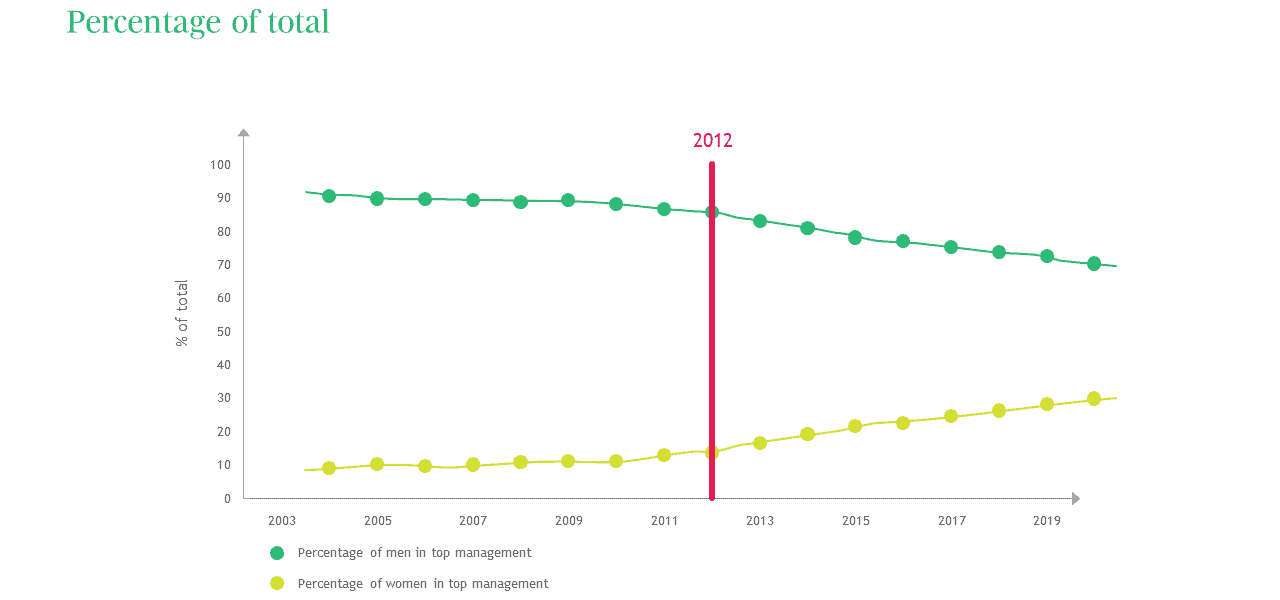An interview with Julia Wiesermann (Managing Director BCG Platinion) and Giulia Dionisio (Former Manager BCG Platinion): Why should women choose Digital-Tech?
Describe the digital tech industry in three words. Why is it so important for women to take part in it?
J: Backbone of the 21st century economy, challenging and breath taking, fun! The digital tech industry is driving innovation across all industrial sectors. It is vital to bring the best thinking and understanding of feasibility, viability, and desirability. This can only be achieved by collaboration and co creation of highly diverse teams—female representation being one factor.
G: Innovative, stimulating, and creative. The digital sector is evolving rapidly, and there is no reason for women not to take part in the transformation.
What pushed you to pursue a career in the digital tech sector?
J: I was always fascinated by magic. IT and digitization were magic to me as a child, something I could not grasp, and triggered my somewhat pronounced curiosity and ambition. The fact that there were almost no visible female leaders in the industry even increased my motivation.
G: When I finished my engineering management degree, there was a strong demand for digital capabilities, so I decided to take my chances in the sector and found out how exciting it was.
What are some of the greatest challenges one needs to meet to advance in this sector?
J: Be a patient and tolerant translator, able to talk about a fascinating but not straightforward world. There are a lot of people who like to talk tech, but who don’t want to listen to your technical details. You also need an ability to make things look super easy and appealing.
G: Demonstrate that age and gender do not have any implication on performance. It is important to work in a meritocratic environment.


In your professional experience, what were the benefits of working in a team based on diversity?
J: Very simple: better jokes, better atmosphere, better outcomes.
G: When working in a heterogeneous environment, everyone has a chance to demonstrate their strengths.
What advice would you give to the women of today and tomorrow considering a career in the digital tech sector?
J: If this is what you are passionate about, do it and don’t overthink things too much. The rest will come!
G: There is no such thing as a man’s or a woman’s job anymore—the digital sector simply needs young talent.
A long but promising road ahead
The number of companies placing diversity, equity, and inclusion at the heart of their strategies is fast increasing. Today’s competitive market is geared toward the personalization of services, multidisciplinary skills, and a scaled reproduction of the surrounding world and its complexities. In such a multifaceted world these topics have become fundamental levers. Previously, companies could compete with a scarcely diversified staff merely structured on the basis of skills. Now it has become clear that, particularly in the digital tech sector, it is increasingly necessary to employ people with heterogeneous backgrounds and varied skills. Only this way it will be possible to create an inclusive environment, and fertile ground for developing new ideas.
In this context arises the question of female employment and, more generally, the commitment to gender equality on all fronts of business activity.

The European context
Within the European context, it is worth highlighting the first results of the policies introduced by companies to favor equal access to job opportunities. Eurostat documents that in Europe, female employment grew by 8% between 2005 and 2019, moving from 58.7% to 67.3%, at a rate faster than for men (+3.9%, 2005–2019).
That represents a more welcoming world, especially when viewed in perspective. Although in Europe in 2021, women only hold 30% of top management roles, the index measuring female employment in top management positions registered a 100% increase since 2012, clearly signaling that the tides are changing.


Even in light of this growth, an important gap remains to be closed, especially for companies operating in digital tech: In Europe only 20% of girls choose an academic degree in ITC (information, communication and technology) against a majority greater than 40% choosing the education, health and welfare, humanities and arts fields.
Given there is no evidence demonstrating some sort of gender-based biological propensity toward one or the other set of subjects, the European Parliament explains a scarce female participation in the scientific and technological sectors by looking at the socio cultural context in which we live. The lack of female role models in tech who could inspire other women; the fear of having to give up a good work-life balance are all factors contributing to a scarcity of women in scientific lecture halls.
Digital tech companies: Measures of gender equality and excellent career prospects
The past few years have seen decisive change of course, manifest in companies actively searching for improvement. Big tech is leading the way: Companies such as Netflix, Amazon and Google are among the most committed to promoting gender equality with policies designed to value their employees.
In “Netflix’s inclusion report,” the company, whose staff is now 47% female, explains the three levers that underpin its strategy to favor inclusion:
- Team building and courses for recruiters, with the aim of identifying and eliminating biases in the hiring process.
- Creating access for young talents by directly collaborating with universities.
- Establishing new networks for managers in order to connect them with diverse realities favoring inclusion.


In recent years, Amazon has applied measures to promote a more flexible and equal parental leave policy, introducing the possibility for smart working in the period following the leave.
Moreover, it declared that before 2025 it is going to invest more than $700 million in mentorship and upskilling programs.
At Google, on the contrary, the focus is on creating opportunities. During the past five years Google.org donated over $55 million to NGOs working in creating gender equality and access to opportunities for women and girls all over the world.
“When women and girls have the resources and opportunities to turn their potential into power, it changes the trajectory of their lives and strengthens entire communities. I’ve seen this in my own life, when bosses—both male and female—gave me stretch opportunities and bet on my leadership.” Jacquelline Fuller, President of Google.org, VP of Google
These examples are placed in a much wider context of digital tech companies of all sizes that, in recent years, have committed themselves to promoting diversity and gender equality. The most recent TrustRadius survey (conducted on a sample of 500 talents in digital tech, half of whom were women), highlighted two significant results for the industry: Around 69% of participants declared that, during the past year, their company had implemented some type of gender equality measure. Furthermore 62% of women interviewed responded positively to questions strictly concerning their career, declaring to be expecting a promotion in the following two years.
Success stories: Women leaders of tomorrow

Not everyone knows that the very first Google office was based in a garage, more precisely Susan Wojcick’s garage, the current YouTube CEO. Wojcick, who had previously worked at Intel in marketing, graduated in history and literature from Harvard, and only later obtained master’s degrees in economics and business administration.
She cocreated almost all Google advertisement and analytics software, such as AdWords, AdSense, DoubleClick, and Google Analytics. Currently the CEO of YouTube, she initially proposed and later oversaw the 2006 company acquisition by Google, an operation totaling around $1.65 billion.
“Though we do need more women to graduate with technical degrees, I always like to remind women that you don’t need to have science or technology degrees to build a career in tech.” Susan Wojcick
Lady Microsoft is the alias given to Silvia Candiani, AD and Country Manager at Microsoft Italy and the first woman in Italy to occupy such a prestigious role, which sees her at the apex of a team of 850 collaborators.
At Microsoft, Candiani deals with technological innovation, which strives to transform private and public companies of many sizes through digitalization. She has always been committed to promoting female leadership and the development of female entrepreneurship.

“We worked with girls to help them express their full potential, but we have also worked with managers regarding unconscious biases. An unconscious co-optation mechanism exists whereby leaders look for traits in others that made them successful. Most leaders are male: When they evaluate a candidate among equally competent ones, they tend to prefer a male in whom they see a more assertive type of leadership and behaviors more similar to their own.” Silvia Candiani

Women at the top, like Susan Wojcick and Silvia Candiani, are increasingly numerous—women who have transformed, innovated, revolutionized, and who remind the female leaders of tomorrow that opportunities are there for the taking.
Others include Safra Catz, CEO of Oracle; Elena Lavezzi, Head of Southern Europe at Revolut; Sheryl Sandberg, COO of Facebook; Mary Barra, CEO of General Motors.
“The biggest message I have for young women is, don’t start cutting off branches of your career tree unnecessarily early. Sometimes women say, ‘I know I want to have a family or play in the local symphony’, and they start pulling themselves out of their career path. You don’t have to take yourself out of the running before you even start.” Mary Barra, CEO of General Motors
Company strategies: How technology can help close the gap
The European Institute of Gender Equality (EIGE) forecasts that it will take around another sixty years before we will reach gender equality in terms of job opportunities and decision-making power. Nonetheless, advanced business models and the usage of intelligent technologies can help to shorten that timeline.
AI (artificial intelligence) will be increasingly valuable in supporting recruitment and for unbiased performance assessments. By hindering subjective interpretations of the data, companies will be able to eliminate managers’ and recruiters’ biases, thus favoring equality.

Gender equality at BCG: A conversation with Monia Martini (People and HR operations Director BCG IGTI) and Alice Monti (HR Lead BCG Platinion)
Inclusion, equity, and diversity have always been at the center of BCG’s business culture. They are intrinsic qualities that not only must be guaranteed to ensure a healthy and stimulating work environment but also, as evidenced by the BCG diversity and innovation survey, can significantly enhance innovation within the company.
At BCG, inclusion must be considered at all company levels, with a specific attention to leadership. We take extra care in the selection process and assess not only technical skills but also an attitude to leadership itself and a candidate’s fit within our business culture. We make sure we have an open dialogue in which we listen to the candidate and discuss all potential options to achieve a good work-life balance at all positions within the company, including those at the top. This dialogue helps in reducing any fears that could arise among candidates.
Equity at BCG is imperative in every step going from attracting new candidates to their promotion. We offer an environment where everybody shares the same opportunities; this unites us. Gender, origin, or sexual or religious orientation are never seen as a discriminating factor—on the contrary, they are regarded as an opportunity. The richer the experiences of our staff, the more BCG benefits overall.
Please find the Italian version of this article here.
About the Authors
Serena is a Consultant in the Milan office of BCG Platinion. She currently manages projects related to the Consumer and Industrial Goods practice with a focus on digital and infrastructural multi-year transformations, new IT applications adoption, software and vendor selection and the implementation of multi-channel customer journeys. She brings experience in the field of Travel, Media and Telco, collaborating on projects of innovation and complex governance programs. Serena holds a Masters Degree in Marketing and Communication from the Catholic University of Milan.
Alice Monti
HR Senior ManagerMilan, Italy
Alice is an HR Lead in the BCG Platinion Milan Office. Alice’s experience focuses on career development strategies and processes. Her breath of action includes compensation, benefits and flexibility models, but also diversity, inclusion and equity plans.
Giulia Dionisio
Former ManagerMilan, Italy
Giulia is a former Manager of BCG Platinion. She now has taken on a new challenge as Head of Digital & Direct Sales at Alpitour. Giulia has several years of experience in digital transformation programs and has worked mainly in the travel & tourism and energy sector. She also has relevant experience in agile ways of working, digital marketing and e-commerce implementation. Before working for BCG Platinion, Giulia worked at Deloitte consulting in the Technology Strategy service line. Giulia is a management engineer graduated with honors from the La Sapienza University of Rome.


